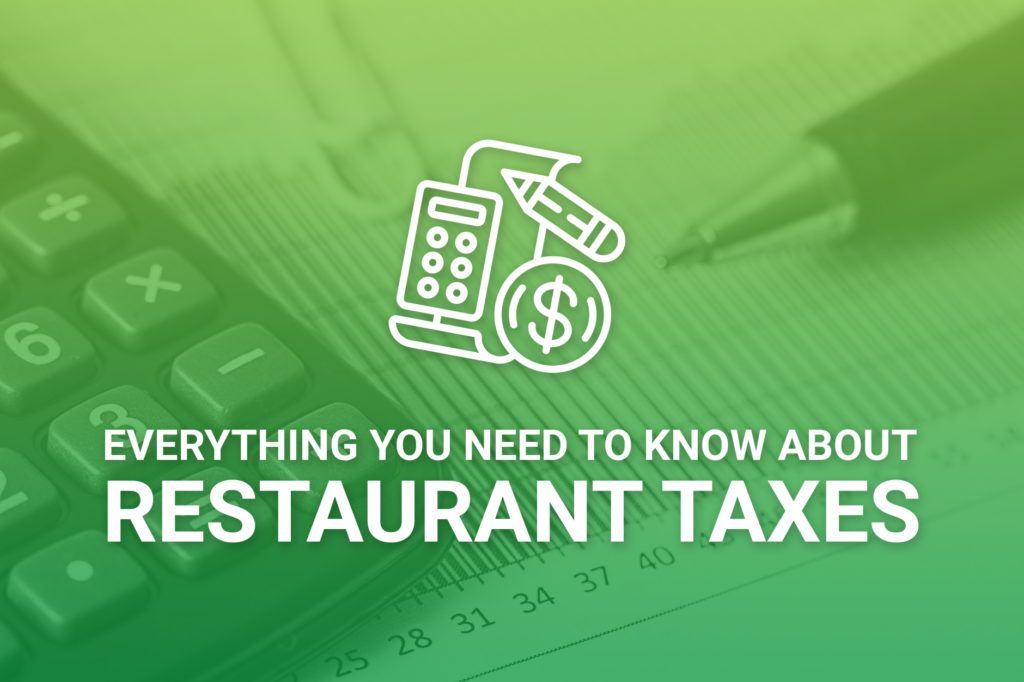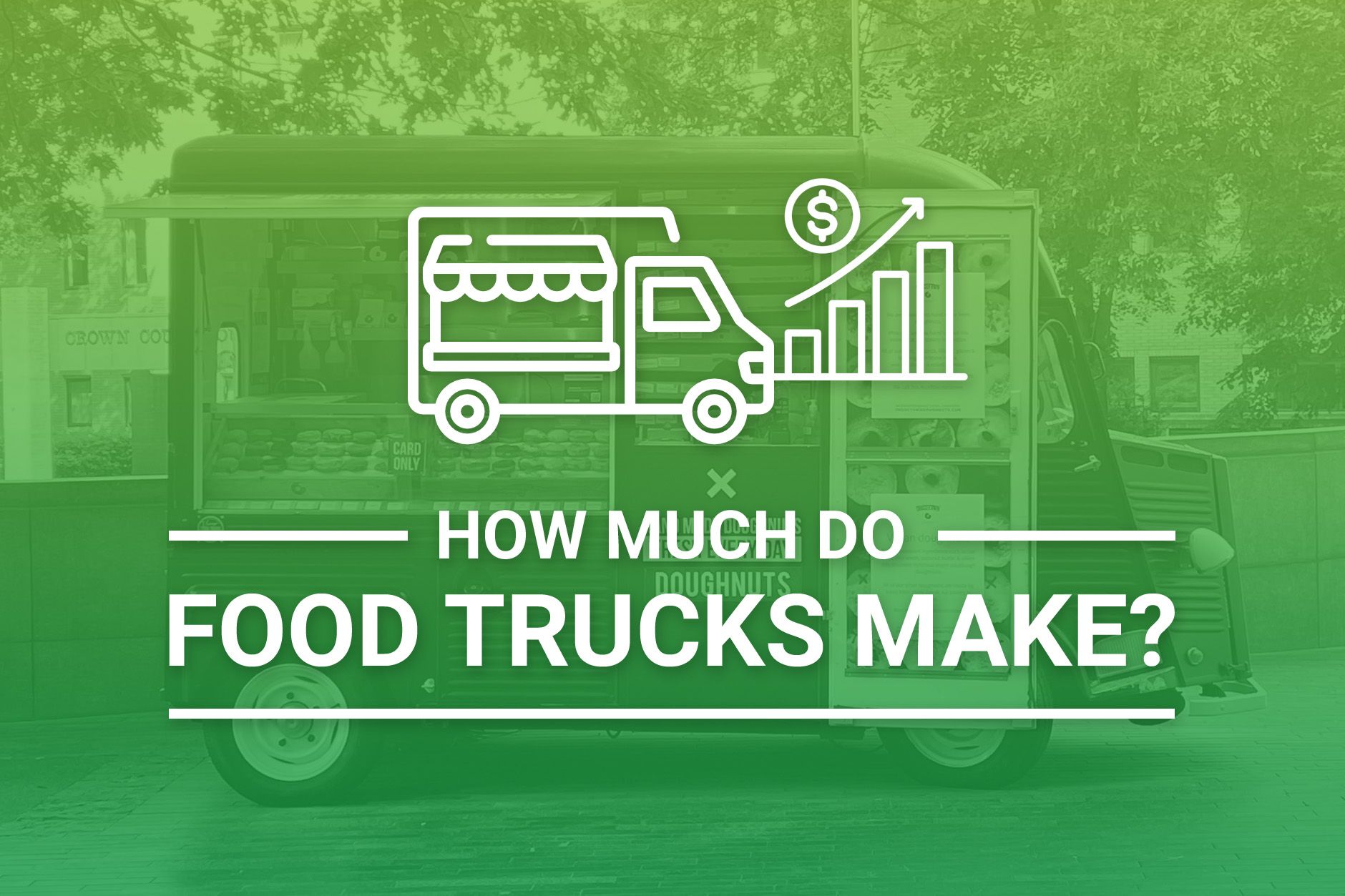Jump to:
- What Taxes Am I Required to Pay as a Restaurant Owner?
- Sales Tax Rates By State
- How Business Structure Affects Taxes
- Are There Any Tax Deductions for Restaurant Owners?
- Grow Your Business
They say that there are only two things that are certain in life: death and taxes. As a restaurant owner, you are probably all too familiar with taxes. In addition to paying federal income tax, owners may also be responsible for a slew of other taxes. Understanding your legal obligations when it comes to taxes is critical to keeping your business up and running.
Depending on where you are located, your profits, and the number of employees you have, you may be liable for a range of federal, state, and local taxes. Working with an accountant is a good way to ensure that your taxes are paid in full and on time. Most restaurant owners also benefit from payroll services and a tracking system to ensure that their records are sufficient come tax time.
Below, we’ll outline the types of taxes that you may be required to pay as a restaurant owner. We’ll also highlight some key deductions that you can take advantage of in order to reduce your overall tax burden. For more specific advice about your restaurant tax situation, consult with a professional.
What Taxes Am I Required to Pay as a Restaurant Owner?
Restaurant owners are generally required to pay taxes to the federal government as well as to their state and local governments. For many entrepreneurs, this can add up to tens of thousands of dollars each year in taxes.
First, restaurant owners must pay federal income tax on their business and personal income. In addition, if your state or local government imposes an income tax, you will also be required to pay income taxes to these entities.
Second, if you have employees, then you will be required to pay federal payroll taxes on their wages. These taxes can range from 2.9 to 12%, and cover things such as Medicare, Unemployment, and Social Security. Employees pay part of these taxes through a payroll deduction, while employers pay their share directly to the Internal Revenue Service (IRS). It’s important to know that employers are required under federal law to include tips and service charges when calculating payroll taxes, as these are considered taxable income to employees.
Third, state governments require employers to pay state unemployment taxes for their employees. Some states may also impose taxes on disability insurance programs. The tax rate and cap on the total amount of taxes varies by jurisdiction, the employer’s industry, and their experience rating.
Fourth, restaurant owners are typically required to pay sales and use tax to their state and/or local government. This amount varies by jurisdiction, with 45 states and Washington, D.C. requiring the payment of sales tax. The only states that do not impose a sales tax are Alaska, Delaware, Montana, New Hampshire, and Oregon, although Alaska allows local governments to charge sales tax.
Sales Tax Rates By State
The current state and local sales tax rates are as follows:
| State | State Tax Rate | Average Local Tax Rate |
| Alabama | 4.00% | 5.22% |
| Alaska | 0% | 1.76% |
| Arizona | 5.60% | 8.40% |
| Arkansas | 6.50% | 9.47% |
| California | 7.25% | 2.97% |
| Colorado | 2.90% | 4.75% |
| Connecticut | 6.35% | 0% |
| Washington D.C. | N/A | 6.00% |
| Delaware | 0% | 0% |
| Florida | 6.00% | 7.05% |
| Georgia | 4.00% | 3.31% |
| Hawaii | 4.00% | 0.44% |
| Idaho | 6.00% | 0.03% |
| Illinois | 6.25% | 2.83% |
| Indiana | 7.00% | 0% |
| Iowa | 6.0% | 0.94% |
| Kansas | 6.50% | 2.18% |
| Kentucky | 6.00% | 0% |
| Louisiana | 4.45% | 5.07% |
| Maine | 5.50% | 0% |
| Massachusetts | 6.25% | 0% |
| Maryland | 6.00% | 0% |
| Michigan | 6.00% | 0% |
| Minnesota | 6.875% | 0.58% |
| Mississippi | 7.00% | 0.07% |
| Missouri | 4.225% | 3.96% |
| Montana | 0% | 0% |
| North Carolina | 4.75% | 2.22% |
| North Dakota | 5.00% | 1.86% |
| New Hampshire | 0% | 0% |
| New Jersey | 6.625% | -0.03% (New Jersey utilizes urban enterprise zones to compete with Delaware. This can result in a lower local tax rate than state tax rate in some areas) |
| New Mexico | 5.125% | 2.69% |
| New York | 4.00% | 4.52% |
| Nebraska | 5.50% | 1.43% |
| Nevada | 6.85% | 1.47% |
| Ohio | 5.75% | 1.42% |
| Oklahoma | 4.50% | 4.44% |
| Oregon | 0% | 0% |
| Pennsylvania | 6.00% | 0.34% |
| Rhode Island | 7.00% | 0% |
| South Carolina | 6.00% | 1.46% |
| South Dakota | 4.50% | 1.90% |
| Tennessee | 7.00% | 2.53% |
| Texas | 6.25% | 1.94% |
| Utah | 6.10% | 1.08% |
| Virginia | 5.30% | 0.35% |
| Vermont | 6.00% | 0.22% |
| West Virginia | 6.00% | 0.41% |
| Washington | 6.50% | 2.71% |
| Wisconsin | 5.00% | 0.46% |
| Wyoming | 4.00% | 1.34% |
The numbers above represent an average sales tax. Depending on the locality, you may pay significantly higher taxes. For example, the New York City restaurant tax is 4.5%, plus a 4% New York state sales tax, and an additional sales tax of 0.375% by the Metropolitan Commuter Transportation District. This makes the total effective restaurant tax in NYC 8.875%. In a different part of New York, that overall tax rate will likely be much lower.
Keep in mind that the above list represents sales taxes. While many jurisdictions tax prepared food in a restaurant under the sales tax rate, some have a separate tax rate for food and beverages sold at bars and restaurants. For example, in Washington, D.C. the sales tax rate is 6.0%, but the tax rate for soft drinks is 8.0%, 10% for restaurant meals, liquor and soft drinks served on premise, and 10.25% for alcoholic beverages sold for off-premises consumption. These different tax rates demonstrate the importance of working with a tax professional to ensure that you are paying the proper tax rate in your city and state.
The fifth and final type of tax that some restaurant owners may be required to pay are health taxes. This controversial type of tax is imposed on products that are considered unhealthy, such as soft drinks or soda. As noted above, the sales tax for soft drinks is higher than the sales tax for other drinks, which is an example of a health tax. These types of taxes are typically imposed by a local government.
How Business Structure Affects Taxes
As you work to form your restaurant, you’ll also want to consider how you’re going to structure your business. The structure of your business will affect how you’re taxed. Below is an overview of the different types of business structures, along with how each structure is taxed. You should consult a business attorney or a tax accountant for help deciding which structure may be best for your new business.
Sole Proprietorship
Under a sole proprietorship, you and your business are considered the same entity. There is no separation between the two. Therefore, your business and personal taxes are combined. Structuring as a sole proprietorship will give you the lowest tax rate out of any of the other business structures. However, you also take on a greater risk with unlimited personal liability.
Partnership
Partnerships can be formed when two or more people share ownership of a business. When you go to pay taxes under a partnership, you’ll file a return of income for your business, as well as your own personal tax return with your share of the business income and losses. Under a partnership, only the partners pay income tax, so the business is not taxed separately. There is still a great deal of risk involved with forming a partnership, too. Partners are held jointly liable for any partnership obligations.
Limited Liability Company
A limited liability company acts as a hybrid between a partnership and a corporation. Owners are all considered members, and profits are passed through to members. Members in a limited liability company file taxes on their own personal returns. You’re still subject to self-employment tax, but any surplus earnings are not taxed.
Cooperative
In a cooperative structure, the company is owned by the members that it serves. Members purchase shares to gain voting rights, and earnings are distributed among members. In general, taxes for cooperatives operate like taxes for corporations, but cooperatives pass through income to members. Individual members then pay personal taxes on cooperative gains. Certain cooperatives, like credit unions, are actually tax-exempt. Under a cooperative structure, surplus earnings also aren’t taxed.
C Corporation
A C Corp. allows a business to be considered an entirely separate entity owned by shareholders. This separation shields owners from personal liability, but the profit of a C corporation is subject to income tax. This can lead to double taxation, as the income is taxed on both the business and personal levels (first when the business makes a profit and second when dividends are distributed).
S Corporation
An S Corp. allows a business to enjoy the same level of limited liability that C corporations have without the double taxation. Under an S corporation, profits and losses from the business are passed through to the personal tax returns of the owners.
Additional Readings On Restaurant Structure
If you’d like to learn more about restaurant structure, there are a few additional resources you may find useful below:
Are There Any Tax Deductions for Restaurant Owners?
Restaurant taxes can add up quickly. In an industry with relatively thin profit margins, paying state, local, and federal taxes can be a burden. Fortunately, there are a number of deductions that restaurant owners can use to lower their income tax burden.
Operating Expenses
Operating expenses encompass all of the expenses you incur to keep your restaurant running. Operating expenses can be broken down into three different categories: fixed costs (expenses that don’t change each month like rent), variable costs (expenses that change with how much you sell like food inventory), and semi-variable costs (expenses with fixed and variable components like labor with salaried and hourly employees). All of your operating expenses can be deducted.
Marketing & Advertising Expenses
Restaurant owners can deduct marketing expenses. This may include everything from advertisements in traditional print, radio, and television media as well as online marketing through social media and other platforms. Having a good marketing plan is vital for the success of any restaurant – and it can also help to reduce your taxes.
Vehicle & Driving Expenses
Offer delivery to your customers? You can deduct certain vehicle and driving expenses from you income.
If you lease company vehicles, you can deduct the full cost of the leases. You’ll want to accurately track usage if you also use your company vehicle for personal use. You can only deduct the percentage of costs associated with business use.
Deductions for buying a vehicle are slightly different. You get to depreciate the vehicle, but you can only depreciate the vehicle if at least 50% of its use is for business.
You’re also able to deduct auto insurance for your company vehicles and the cost of miles driven. The IRS lets you deduct $0.585 for every mile driven for business trips. Business trips include:
- Delivering orders to customers
- Driving to pick up work supplies
Unfortunately, business trips do not include the miles you drive to get to work from your home. That is considered a personal trip.
Employee Pay & Benefits
Restaurant owners can also deduct wages and other expenses related to staffing (including benefits) from their income. While you will still have to pay payroll taxes on employee wages, the ability to deduct staffing costs can reduce your taxes.
Cost of Goods Sold (COGS)
The cost of preparing and serving food can also be tax-deductible. Everything from food to utensils to menus to napkins to serving ware can be tax-deductible. If you use custom-branded disposables, they may also be considered a deductible business expense.
Property Improvement, Equipment, & Materials
The cost of any improvements that you make to your restaurant facility can be depreciated over time. This could be expenses like building a deck to add additional outdoor seating, installing a drive-through window, or simply buying new tables and chairs.
You can depreciate the purchase of new equipment the same way. Looking to buy a new dishwasher, pizza oven, or grill? All of these things can be depreciated for tax purposes.
Repairs & Maintenance
The difference between improvements and repairs is that improvements are depreciated over several years while repairs are deducted the year that they’re made. Repairs and maintenance includes things like fixing plumbing leaks, repainting dining rooms, and buying parts for equipment.
Charitable Donations
Donating to charitable causes may already be a part of your brand’s mission, but it could be something worth considering if it’s not. You can deduct charitable donations you make up to a certain limit. You’ll want to discuss CPA before making charitable donations. Your donation limits will depend on how your restaurant is structured. You’ll also want to make sure you’re donating to a qualified organization.
Donations do not necessarily have to be money. You can also donate food, services, or restaurant gift cards. Charitable giving lets you give back to the community while also reducing your taxable income.
Operating Losses
Net operating losses (NOL) occur when a company’s allowable deductions exceed its taxable income. Net operating losses can be used to offset income in future tax periods through loss carryforwards. Net operating losses can be complex to account for and there are limitations to NOL carryforwards. It’s best to consult a CPA about accounting for a net operating loss.
Additional Miscellaneous Deductions
Other expenses may be tax-deductible as well. This may include legal fees that are necessary for running your restaurant and even tax preparation fees that allow you to comply with your legal obligations regarding taxes. Certain types of insurance are also deductible for restaurant owners, including commercial general liability insurance.
Of course, restaurant tax laws are complicated. The best option for restaurant owners is to carefully track expenses related to their restaurant and work with an account, lawyer, or other restaurant tax professional to ensure that they are paying taxes properly – and getting every possible deduction that they are entitled to under the law.
Once You Figure Out Restaurant Tax, We Can Help Your Business Grow
Running a restaurant is hard, particularly with the ever-changing restaurant tax rules and laws. While paying taxes and tracking expenses can be challenging, one aspect of running your business doesn’t have to be. At Budget Branders, we make it easy for you to market your business using custom disposable products.
As a small business, we know how challenging it can be to stay in the black. That is why we are committed to helping fellow entrepreneurs succeed. We offer branded cups, bowls, coffee sleeves, bags and more at prices and in quantities that make sense for small to medium sized businesses.
Want to learn more? You can fill out our online contact form, or click on the live chat button at the bottom right of your screen.
The tax information disclosed above does not constitute legal or financial advice. Use this information at your own discretion and consult a legal or financial professional for further guidance.




















